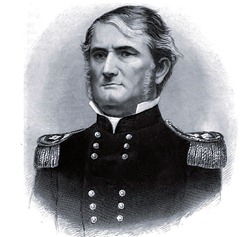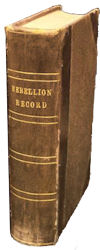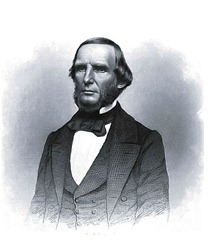
—The Ninth Regiment of Massachusetts, numbering one thousand men, under the command of Colonel Cass, arrived at Washington.—National Intelligencer, July 1.
—This morning at daybreak fourteen rebel scouts attacked three pickets of the Fourth Pennsylvania Regiment, belonging to Company E, stationed on Shuter’s Hill, Va., four miles from Alexandria, wounding Lewellan Roemer, of Blue Bell, and killing Thomas Murray, of Norristown. The pickets returned the fire, killing two rebels and wounding a third. One of the slain was a sergeant of the Letcher Guard. The rebels beat a hasty retreat. The firing having been heard by the Union troops, a detachment of Zouave and another of the Fourth Pennsylvania Regiment reinforced the pickets, and followed in the trail of the rebels for some distance, finding four rifles and three revolvers, which the latter threw away in their hasty flight. One of the revolvers, very valuable, was marked with the name of John Johnson, a farmer living in that vicinity, who is a noted rebel. The Pennsylvanians behaved with great spirit and with the coolness of veterans, boldly holding their position, though wounded, in the hope of being reinforced.— N. Y. Herald, July 1.
—John Williams, who behaved so bravely in the skirmish at Matthias Point, carrying the American flag out of the fight in safety, though it was completely riddled with bullets as he went, was promoted to the post of Master’s Mate for his gallant conduct.—N. Y. Times, July 1.
—Yesterday the armed steamer Sumter, “of the Confederate States Navy,” ran the blockade of New Orleans, and got safely to sea. The New Orleans Picayune, in noting the fact, said:—”The first vessel of our little navy, the C. S. steamer-of-war Sumter, sailed on Saturday last, on a cruise, having ran the paper blockade of the Lincoln Abolition war steamers, off the mouth of the Mississippi. She has a picked crew, and her commander is known to be a most brave and chivalrous sailor, and he has under him a most gallant set of officers: Commander, Raphael Semmes; Lieutenants, John M. Kells, R. F. Chapman, W. E. Evans, J. M. Stribling; Paymaster, Henry Myers; Passed Assistant-Surgeon, Francis L. Gait; Lieutenant of Marines, Becket E. Howell; Midshipmen, Richard F. Armstrong, W. A. Hicks, A. G. Hudgins, J. D. Wilson; Gunner, Thomas C. Cuddy; Sail-maker, M. P. Beaufort; Engineers, First Assistant, acting as chief, Miles J. Freeman; Second Assistant, W. P. Brooks; Third Assistants, Matthew O’Brien and Simeon W. Cummings. She has a crew of sixty-five men and twenty marines.”
—The Charleston Mercury published the following on the Confederate Commissioners in Europe: It is now several months since our commissioners were sent to Europe. Thus far it seems they have got no further than England. Mr. Rost, one of them, has gone over to France; but as he can have no authority to act alone, we presume that he goes rather to ascertain the views of the Emperor of the French than to make a treaty. We infer from Mr. Rost’s departure from London to Paris that nothing has been accomplished in England.
Indeed, from the order in Council forbidding Confederate privateers bringing their prizes into British ports, we are only surprised that any of the Commissioners should have remained in London a day after this new order was issued. This is an act of quasi hostility, which, it appears to us, ought to have arrested a conference with the British authorities. It was well known that, whilst Great Britain has the greatest interest in the independence of the Confederate States, there is an element of antislavery fanaticism which would, in all likelihood, paralyze her counsels in our favor.
Why our commissioners have lingered so long in England, and have not gone directly to the greatest source of success, the government of France, we are at a loss to determine. By pretermitting the Emperor of the French, the British ministry have had the opportunity of obtaining, perhaps, his co-operation in the line of policy they design to pursue. By a direct communication with him, he would most probably have controlled instead of supporting the policy of England.
We, of course, do not know the means used by our government to conciliate the prompt acknowledgment of our independence by France and England, but it is clear, if we expected them to depart from that policy which the laws of nations strictly required, we must offer them inducements of industry. Our separation from the North, and our lower tariff, certainly gave them the prospect of great commercial advantages, from our independence; but the tariff might be changed—it might be made low from motives of present policy, and we might, after that policy is accomplished, in our independence have renewed higher duties. To present to these great States alluring assurances of present commercial advantages, it appears to us our commissioners ought to have proposed a low maximum of duties, to extend over many years yet to come.
It is absurd to suppose that either France or Great Britain will run the risk of disagreeable, if not hostile complications with the United States, without the security of clear advantages to be obtained. When we have fairly fought out our independence, of course all foreign nations will acknowledge us; but to take us by the hand when we are weak and want their aid, and when our position is surrounded with doubts—in their opinion, at least—as to our future success, we must offer such inducements, strongly appealing to their interests, as will indemnify them for all risk in taking us in their embraces by friendly commercial treaties.
Have our commissioners been empowered to offer to France and England a treaty guaranteeing for a number of years low duties on their manufactured commodities imported into the Confederate States? We fear not; for if they had been empowered to make such treaties, we are satisfied that they might have returned home with their mission completely successful, and the war on our frontier, on the part of the United States, reduced to a weak absurdity.
 —Leonidas Polk, better known as Bishop Polk, of Louisiana, having received the appointment of Major-General in the rebel service, assumed the command of his division. His headquarters were at Memphis, Term., in the neighborhood of which the troops comprising his command had their rendezvous. “This is the first instance,” says the Memphis Appeal “in the country ‘s history of the appointment of a high-church dignitary to a position of so much responsibility in the military service, and will, therefore, as a matter of course, evoke criticism among the old fogies of the red-tape school. But apart from the fact that the acceptance of this appointment was urged upon Gen. Polk with great earnestness by the President, the general-in-chief of the army, and other military officers of distinction who are well acquainted with his qualifications, there is much in the character and history of the appointee which inclines to the opinion that the selection is highly judicious, and one which will give great satisfaction. General Polk received a thorough military education at the West Point Academy, which he entered, from North Carolina, in 1828. He graduated with honor and entered the United States service, his first commission as second lieutenant of artillery bearing date July 1, 1827.
—Leonidas Polk, better known as Bishop Polk, of Louisiana, having received the appointment of Major-General in the rebel service, assumed the command of his division. His headquarters were at Memphis, Term., in the neighborhood of which the troops comprising his command had their rendezvous. “This is the first instance,” says the Memphis Appeal “in the country ‘s history of the appointment of a high-church dignitary to a position of so much responsibility in the military service, and will, therefore, as a matter of course, evoke criticism among the old fogies of the red-tape school. But apart from the fact that the acceptance of this appointment was urged upon Gen. Polk with great earnestness by the President, the general-in-chief of the army, and other military officers of distinction who are well acquainted with his qualifications, there is much in the character and history of the appointee which inclines to the opinion that the selection is highly judicious, and one which will give great satisfaction. General Polk received a thorough military education at the West Point Academy, which he entered, from North Carolina, in 1828. He graduated with honor and entered the United States service, his first commission as second lieutenant of artillery bearing date July 1, 1827.
“He did not remain long in the army, however, but resigned in December of the same year, and embarked in another and different field of usefulness. General Polk will bring to the discharge of the duties of his position, a mature judgment, ripe scholarship, unusual activity of mind and body, great firmness and decision of character, a chivalric bearing, and the presence and mien of a thorough soldier. Though not a stickler for mere etiquette of the camp, he is a rigid disciplinarian, and, withal, the very man to win the confidence, and command the respect of his soldiers.”
—A correspondent of the Charlatan (S. C.) Courier, writing from Richmond, Va., says:— “There are few points of a war character which, just at this time, can appropriately form the subject of a letter. All eyes, however, are directed towards Manassas, and it is not improbable that by the time these lines reach your readers, the telegraph will have preceded me with the details of a great battle. The northern despatches all indicate the gradual approach of the two armies, the strengthening of outposts and various other movements which forerun hostilities. The southern press, on the contrary, are discreetly silent, and all we know is what we see ourselves, or hear from those who have seen for us; but the two sources of intelligence concur in the fact that unless the good Lord creates a modern Babel at Manassas and Alexandria, or drops down between the armies a veil of Cimmerian darkness, nature, personal gravitation, and animal magnetism will as certainly conspire to produce a collision as the multiplication table tells the truth.
“There are some yet, however, who affect to believe that we shall have a peace before we have a fight. The reaction so long predicted at the North having begun, the circulating petitions of merchants, bankers, clergymen, and other citizens of New York, which are pressing their peaceful influences upon Abraham Lincoln, are also operating here. The question is already being discussed in its various bearings, and the auspicious event has even been assigned a place this side of Christmas.
“We have no idea, however, of giving up the contest without, at least, one grand exhibition of the power, the prowess, and the resources of the people who have been stigmatized as the ‘ruffian rebels of the South.’ We went into the war on principle. Let us come out on principle, but not until we have left a mark upon our enemies that will secure for us for all time to come the respect of the world.
“Two hundred thousand men we have in the field will not be content to lay down their arms in peace until they have struck a blow that shall quiver through the North; and unless this be done, the millions they have left behind them will have their ‘welcome home’ alloyed by the thought that their husbands, sons, and brothers have returned without teaching that lesson of humiliation to an insolent foe, which, next to the Lord’s Prayer, has been the uppermost desire in every southern heart.
“In a civil point of view, as rapidly as circumstances will permit, the wheels of government are being geared and the machinery set in motion. The old adage that ‘large bodies move slowly,’ meets its falsification every hour. The operations of the various departments are in fall blast, and from the President down to the errand boy, every man moves as if he was a confederation of steel springs. Nor is this activity confined alone to the government. Artisans and merchants have all the work they can do in supplying the demands upon their several vocations incident to the presence of an army of needful soldiers.
“Blacksmiths are fabricating bowie knives; machinists are making arms and altering flint to percussion locks; millers are turning out floor; bakers are kneading bread by the ton, while butchers, grocers, and caterers generally are beleaguered day and night to supply the wants of the augmented population. Clothing, shoes, accoutrements, and camp equipage—all find ready sale. The frequent arrivals hereof poorly uniformed companies keep the ladies likewise up to their elbows in business.”



 —Ben. McCulloch, Brigadier-General of the rebel forces, issued a proclamation to the citizens of Arkansas, as follows:—”To defend your frontier, troops of Missouri are falling back upon you. If they are not sustained, your State will be invaded and your homes desolated. All that can arm themselves will rendezvous at Fayetteville, where they will await further orders. All those who have arms of the State, will march to the scene of action, or give their arms to those who will not desert their country in the hour of danger. All organized companies, whether cavalry or infantry, will report at Fayetteville, and will at once be formed into regiments and battalions. The necessary subsistence stores will be forwarded from this post. Rally promptly, then, citizens of Arkansas, and let us drive this Northern horde back from whence they came.”—Memphis Argus, July 1.
—Ben. McCulloch, Brigadier-General of the rebel forces, issued a proclamation to the citizens of Arkansas, as follows:—”To defend your frontier, troops of Missouri are falling back upon you. If they are not sustained, your State will be invaded and your homes desolated. All that can arm themselves will rendezvous at Fayetteville, where they will await further orders. All those who have arms of the State, will march to the scene of action, or give their arms to those who will not desert their country in the hour of danger. All organized companies, whether cavalry or infantry, will report at Fayetteville, and will at once be formed into regiments and battalions. The necessary subsistence stores will be forwarded from this post. Rally promptly, then, citizens of Arkansas, and let us drive this Northern horde back from whence they came.”—Memphis Argus, July 1.

